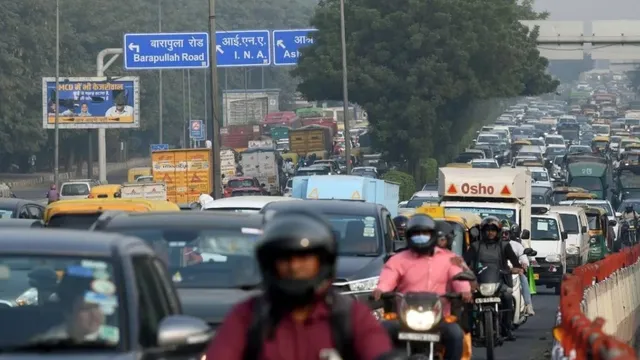- By Kanika Sachdeva
- Sat, 27 Sep 2025 07:02 AM (IST)
- Source:JND
Cafe 3 Emission Norms: Following the implementation of GST 2.0, the Indian government's Bureau of Energy Efficiency (BEE) has proposed capping the average carbon dioxide (CO2) emission limit at 71.5g/km under CAFE III norms for the period 2027-2032. CAFE (Corporate Average Fuel Economy) III norms, also known as CAFE 2027, mark the third phase of India's fleet-wide fuel efficiency and CO2 targets.
CAFE 3 Norms: CO2 Emission Target for 2027-32
With CAFE III norms tightening the noose further on passenger vehicles, manufacturers are now bound to produce more fuel-efficient and sustainable vehicles, including hybrids and EVs. According to the draft rules proposed under CAFE III, the average carbon emission reduction target is set at 71.5g/km, with the first year limiting the carbon emission to 88.4g/km. The existing limit is 113g/km under CAFE II. The CAFE III emission norms will take effect in April 2027.
Also Read: Audi India Extends Support To Flood-Affected Cars In Kolkata
CAFE 3 Norms: Relief for Small Cars
Having said that, the draft offers specific relief for small petrol cars while incentivising electric vehicles and alternative fuels. Small petrol cars, those under 4,000mm in length, weighing under 909kg, and having engines below 1,200cc, are entitled to a further reduction of 3g/km in their manufacturer-declared CO2 performances for CAFE calculations. The relaxation, however, is subject to a cap of 9g/km per manufacturer per year.
CAFE 3 Norms: Incentives for EVs and Hybrids
As for EVs and alternative fuels, the draft proposes a credit multiplier system to encourage the automotive industry to adopt cleaner fuels. The credit system is premised on a weight-based formula, rather than on a fixed emissions limit. It links each manufacturer's fuel consumption target to the average weight of its fleet, ensuring lighter fleets are given lower limits and heavier fleets higher fuel consumption limits. However, the baseline tightens every year from FY2027-28 through FY31-32.
Here's a breakdown of credits EVs and hybrids will get:
| Vehicle | Credit |
| BEV/Range Extender Hybrid | 3 |
| Plug-in Hybrid/Ethanol-based Strong Hybrid | 2.5 |
| Strong Hybrid | 2 |
| Flex Fuel Ethanol | 1.5 |
Alongside, the draft also introduces 'carbon neutrality discounts' for the following fuel options:
| Fuel Type | Discount |
| Petrol (E20-E30 blends) | 8 per cent |
| Flex Fuel Ethanol and Strong Hybrids | 22.3 per cent |
| CNG | 5 per cent or higher, depending on blending levels |
The credit multipliers and carbon neutrality discounts are aimed at encouraging auto makers to reduce carbon emissions by introducing more EVs, hybrids, flex fuels, and ethanol-blended vehicles. Unlike last year's initial draft proposal, this year's draft omits mention of Hydrogen fuel cell electric vehicles (FCEVs).
Also Read: Made In India Honda City And Elevate Receives High Demand Overseas, Brand Exports 2 Lakh Units
CAFE 3 Norms: Compliance Pooling Explained
Lastly, the draft also allows up to three original equipment manufacturers to form a compliance pool. For regulatory purposes, each pool will operate as a single entity, with a fleet-average CO2 emissions calculation based on the collective sales of its member companies. If the pool fails to meet the CO2 target, a designated pool manager will assume responsibility for penalties. The CAFE 3 emission norms do not cover small-scale manufacturers with annual production volumes of less than 1,000 units.

